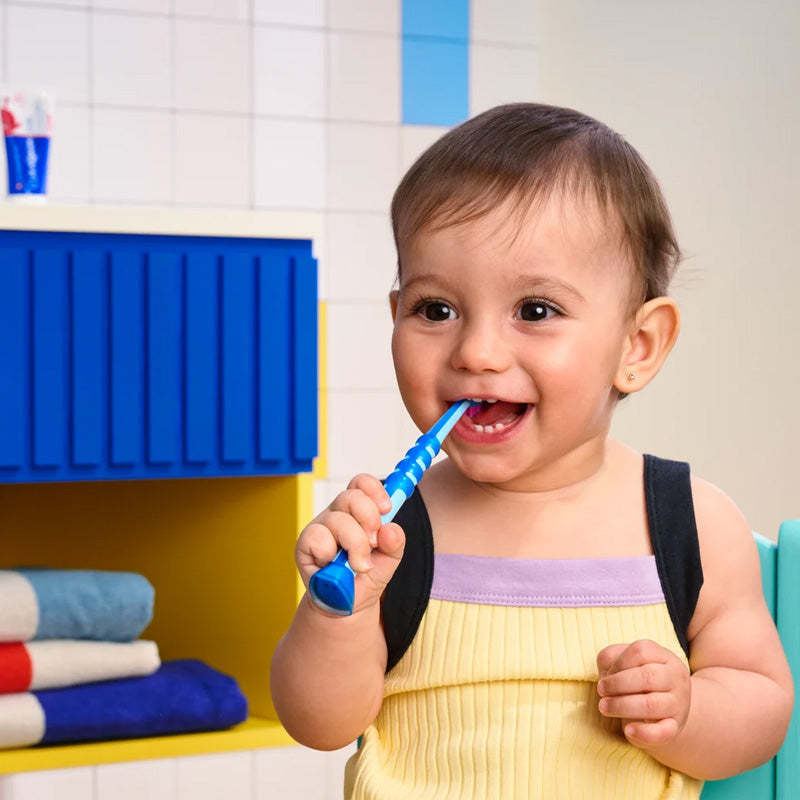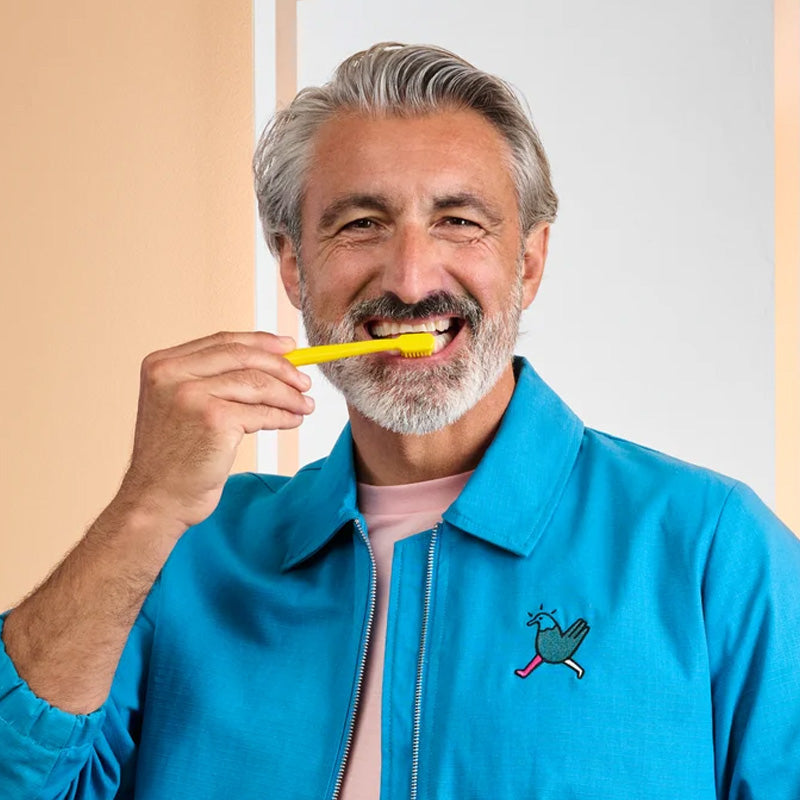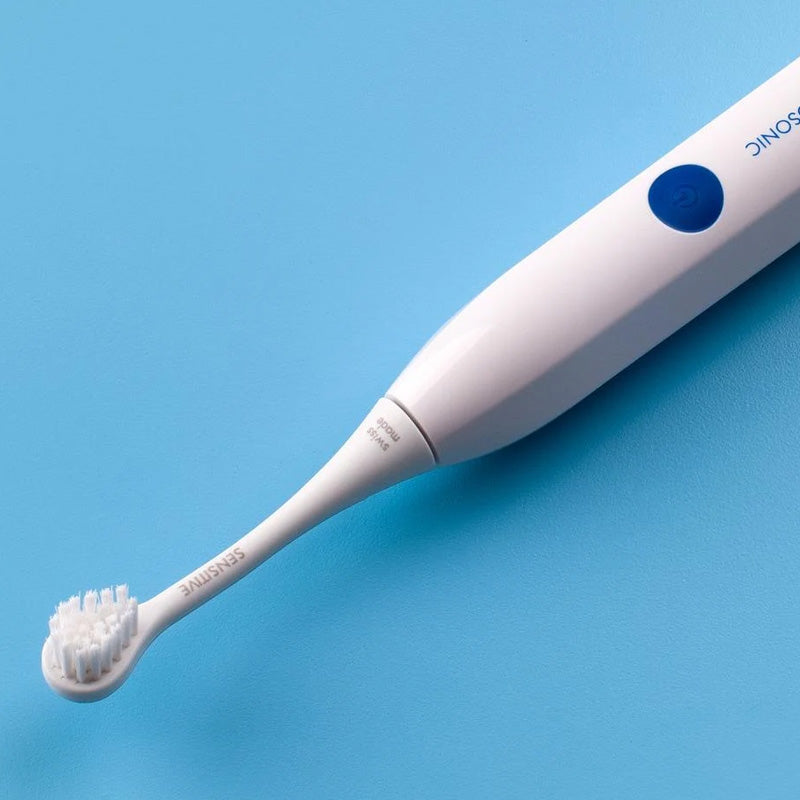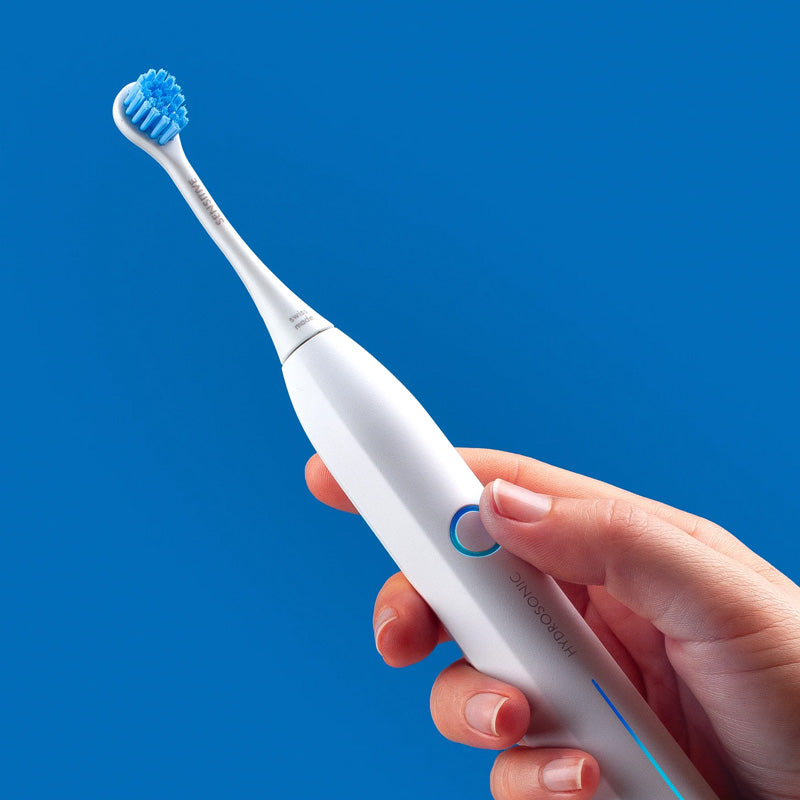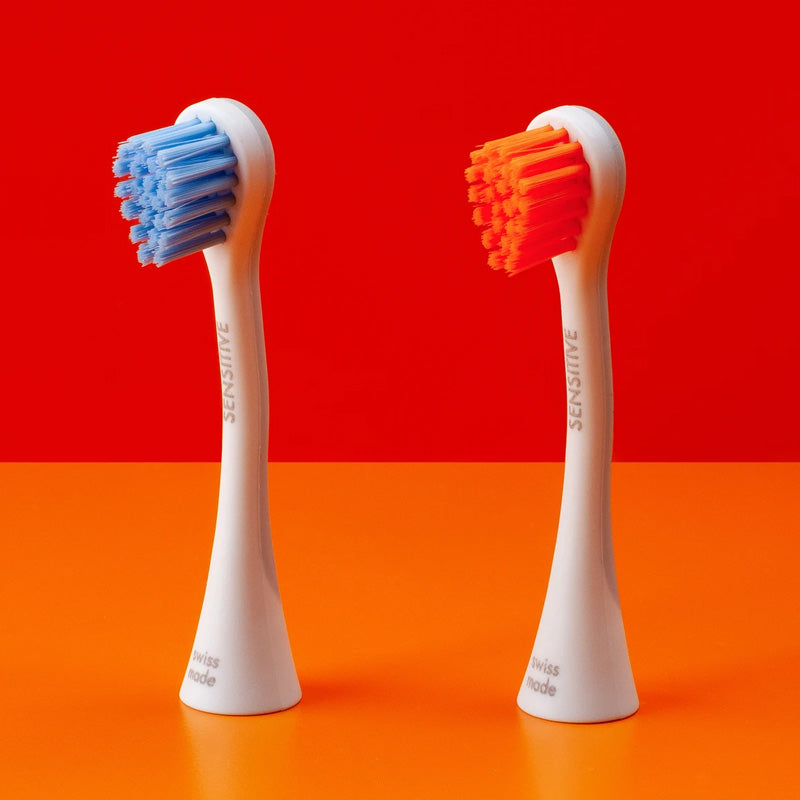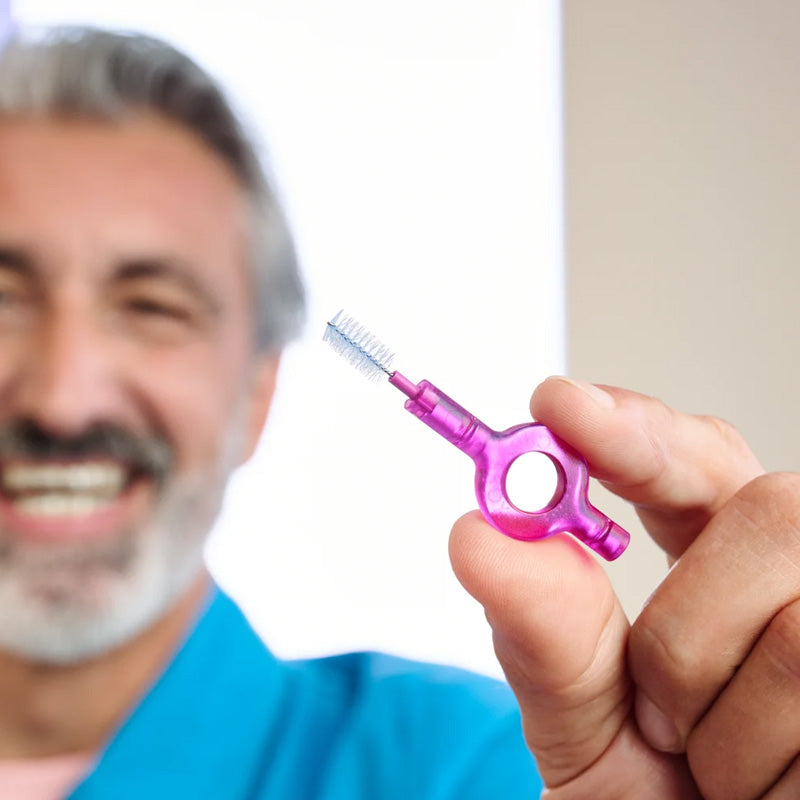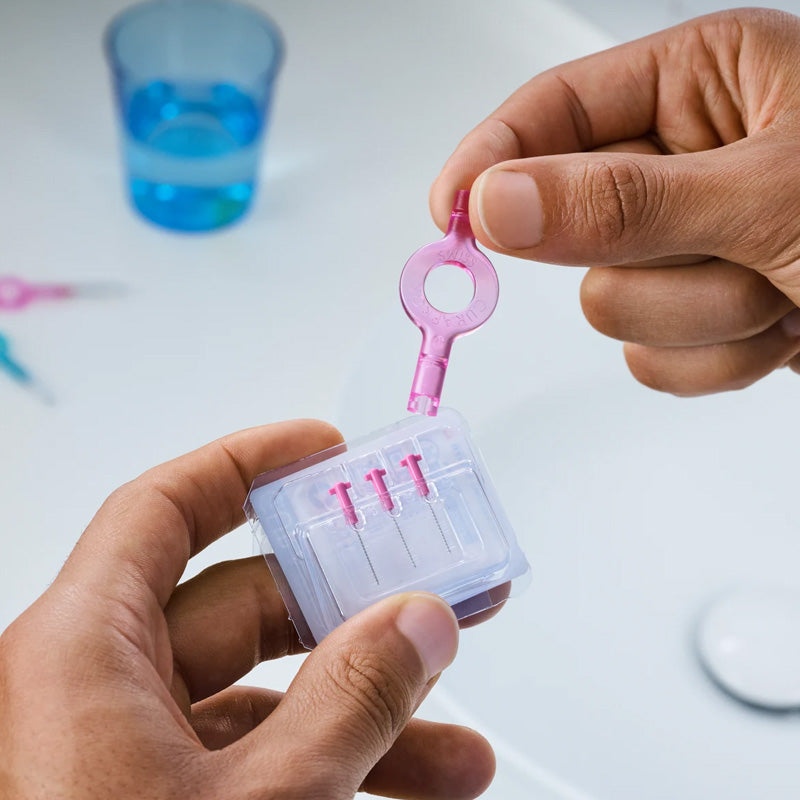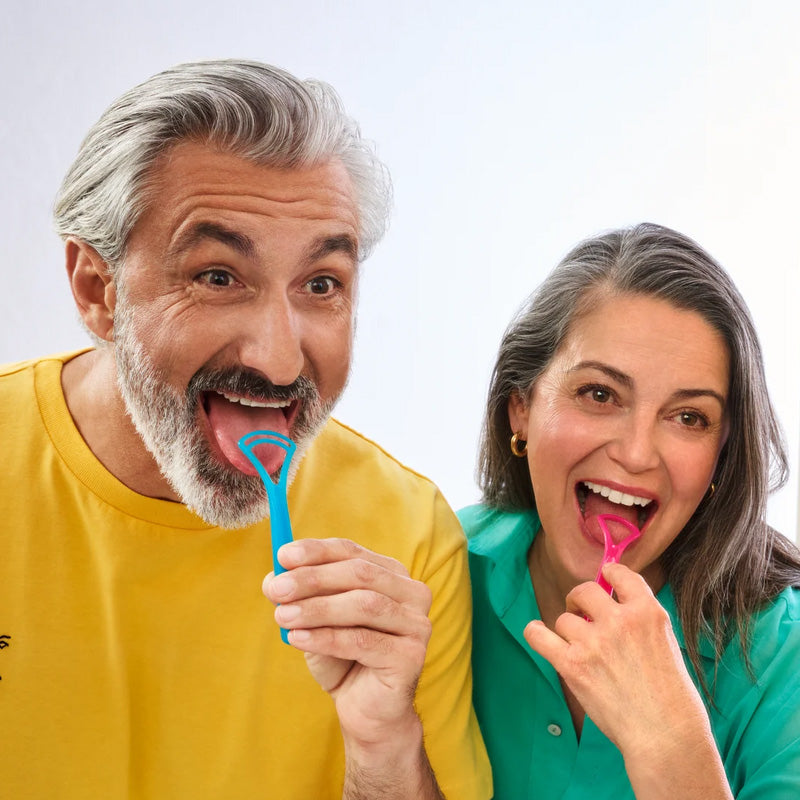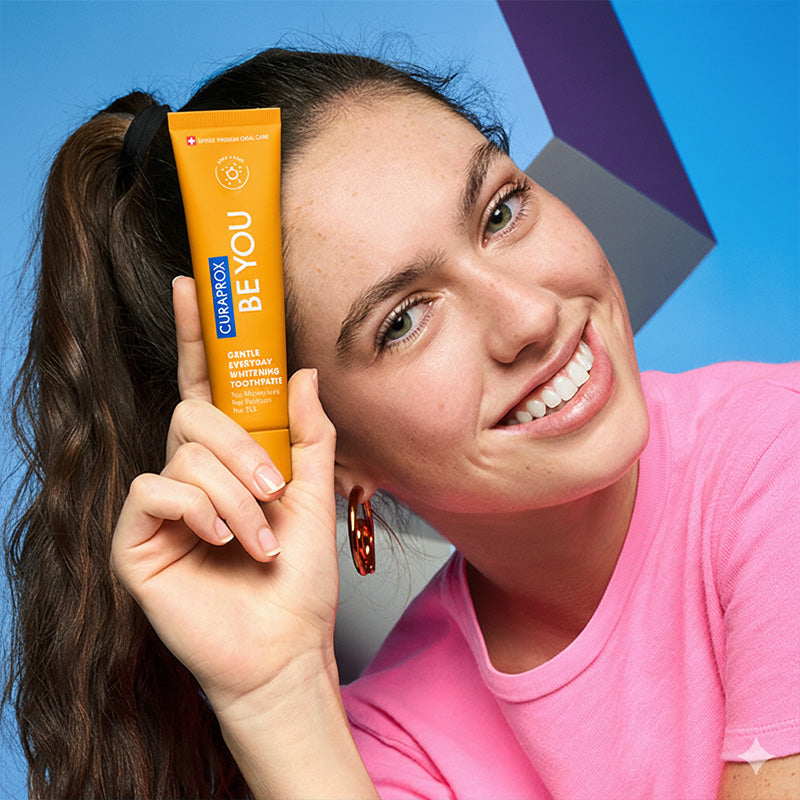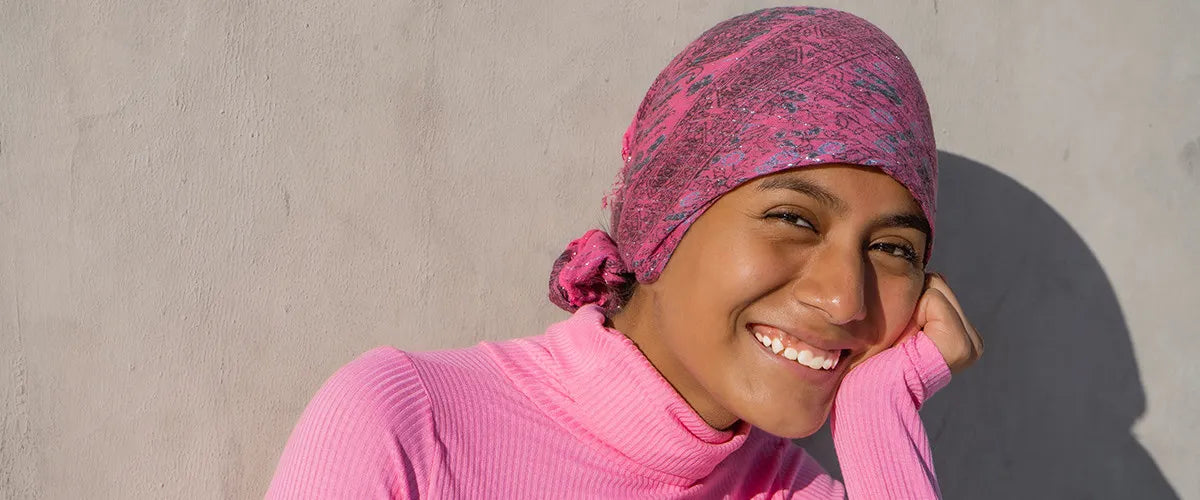Modern cancer therapy offers many opportunities. However, it is not without side effects for those affected. The oral cavity is often particularly affected - even if it is not a head and neck tumour. This is why dental care plays a particularly important role in accompanying cancer therapy.
Here you can find out what oral side effects cancer patients can expect, how to best prepare for treatment in order to minimise side effects and what exactly dental care should look like during cancer treatment.
Possible side effects of chemotherapy and radiotherapy at a glance
The following side effects can occur in the mouth during cancer therapy:
- Sore spots that heal badly
- Severe redness
- Burning sensation
- Dry mouth
- Numbness
- Change or loss of flavour
- Chapped lips
- White spots (oral fungus)
- Swollen gums
- Bleeding gums
- Gum recession
- Ulcers on the oral mucosa
- Severe pain in the mouth, toothache
- Loose teeth & tooth loss
- Swallowing difficulties
- Death of the jaw (in rare cases)
These symptoms are often perceived as very distressing. While inflammation and pain usually disappear again, other symptoms such as dry mouth and difficulty swallowing can remain permanent. Let's now take a closer look at the possible side effects after treatment.
Side effects of chemotherapy in the mouth
During chemotherapy, tumour cells are destroyed by administering drugs known as cytostatics. These drugs attack cells that divide particularly quickly. On the one hand, this applies to tumour cells, which multiply significantly faster than healthy cells. On the other hand, there are also healthy cells in the human body that divide faster than average and can also be affected by the medication: the cells of the hair roots, nails, mucous membranes and haematopoiesis. As the mouth and throat area consists mainly of mucous membrane, side effects in the mouth are common during chemotherapy - even if the tumour is located in another part of the body. Some of the side effects also occur during radiotherapy.
Oral mucositis during chemotherapy and radiotherapy
Both chemotherapy and radiotherapy can cause inflammation of the mucous membranes in the mouth (technical term: oral mucositis). During chemotherapy, there are fewer white blood cells (leukocytes) in the blood than usual. As they are responsible for the defence against bacteria, fungi and other germs, fewer white blood cells mean an increased risk of inflammation. Radiotherapy can also damage the cells of the oral mucosa in the irradiated area.
With conventional chemotherapy, up to 60 per cent of patients develop inflammation in the oral cavity; with high-dose chemotherapy with the substances docetaxel, 5-fluorouracil and anthracyclines, the figure is as high as 70 per cent. This is used, for example, before a bone marrow or stem cell transplant. Inflammation in the mouth caused by chemotherapy occurs particularly frequently on the cheeks or tongue.
The severity of the inflammation ranges from redness and swelling to a sore mouth and bleeding ulcers and, if severe, can cause very severe pain that makes eating and drinking impossible. In such cases, patients are fed artificially.
Whether inflammation of the oral mucosa occurs during chemotherapy depends in part on the medication or the dosage. However, there is also an increased risk if the following factors apply:
- Poor oral hygiene
- Pre-existing conditions in the mouth (e.g. tooth decay or periodontitis)
- Dry mouth
- Hereditary disposition
- Liver or kidney dysfunction
- Chemotherapy or radiotherapy in the past
Good to know: You can find out what helps with oral mucositis caused by chemotherapy in our article: Treating and preventing mucositis
Inflammation of the gums
As the gums also consist of mucous membrane, gingivitis is also common during chemotherapy. Gum inflammation is the precursor to periodontitis, an inflammation of the periodontium that is accompanied by gum recession and can also lead to tooth loss in advanced stages. The risk of developing periodontitis is increased for cancer patients.
Read more about periodontitis in our article: Periodontitis: Symptoms, causes and the correct treatment
Mouth fungus
The inflamed oral mucosa allows pathogens such as bacteria and fungi to penetrate the tissue more easily and have an easy time of it. For example, this can also lead to the formation of oral thrush (oral fungus). This disease usually only occurs in adults with a weakened immune system and is otherwise more common in small children. When the mouth is infected by fungus, white patches form which, when wiped off, reveal reddened, sore areas.

Bleeding gums after chemotherapy
Chemotherapy can reduce the number of blood platelets (thrombocytes). As a result, those affected bleed more quickly. The oral mucosa becomes thin and sensitive and the gums tend to bleed easily - for example when brushing teeth. An ill-fitting denture or a sharp edge of bread can also quickly cause bleeding.
Good to know: Thorough yet gentle tooth cleaning is essential. This means a toothbrush with very soft bristles, such as the , combined with a gentle enzymatic toothpaste such as and, very importantly, thorough interdental cleaning with perfectly adapted .
Vomiting and nausea during chemotherapy
Chemotherapy drugs can activate the vomiting centre in the brain, causing nausea and even vomiting. This is a natural reflex in which the body recognises the potentially harmful substances and wants to eliminate them as quickly as possible. In order to prevent this reflex, patients are given medication that suppresses the nausea (antiemetics) if necessary.
If these medications do not work, sufferers should rinse their mouth well after vomiting so that the stomach acid cannot attack the teeth and gums.
Strange taste in the mouth during chemotherapy and radiotherapy
Many cancer patients notice an altered sense of taste in the head and neck area after chemotherapy or radiotherapy. The taste in the mouth is sometimes described in very different ways:
- Bad
- Sour
- Sweetish
- Bitter
- Metallic
- Salty
Those affected often find that bitter food tastes even more bitter and sweet food tastes either less sweet or even sweeter than it actually is. Favourite dishes can suddenly taste oversalted or too bland. Protein-rich foods such as meat and fish in particular are often perceived as bitter.
Can you lose teeth through chemotherapy?
The answer to this question is not entirely clear: chemotherapy does not directly attack the teeth, but it does favour the development of diseases that can lead to tooth loss. On the one hand, chemotherapy favours periodontitis, which can lead to gum recession and inflammation in the jawbone. In the advanced stage of periodontitis, teeth only sit loosely in the bone and can also fall out. On the other hand, chemotherapy can also disrupt the supply of nutrients to the teeth by attacking blood, lymph and nerve tissue. This can quickly lead to chronic inflammation of the tooth root, which, if left untreated, can cause the tooth nerve to die. As a late consequence of chemotherapy, teeth may therefore fall out or die sooner.
If, in addition to chemotherapy, medication is given to prevent cancer growth in the bone, this can affect the stability of the jawbone and also lead to teeth only sitting loosely in the jaw. You can find more information on this in the section on jaw necrosis.
Side effects of radiotherapy in the neck and head area
Radiotherapy can also cause side effects in the mouth and affect the teeth. Ionising radiation destroys cancer cells by causing damage to the DNA and thus stopping cell division. As a result, the irradiated tumour becomes smaller or even disappears completely. However, the radiation also damages the healthy cells that are hit. In contrast to the mutated cancer cells, healthy cells can usually regenerate after the damage. This means that inflammation of the oral mucosa and redness in the irradiated area disappear again after treatment.

Radiotherapy can only cause side effects in the mouth area if a neck and head tumour is irradiated. If the tumour is located in another part of the body and chemotherapy is not used at the same time, no damage to the mouth and teeth is to be expected.
Dry mouth after radiotherapy or surgery
When tumours in the neck and head area are irradiated, the minor or major salivary glands may be damaged and stop producing saliva. It may also be necessary to remove the submandibular salivary gland as part of a neck dissection. This is a surgical procedure in which the lymph nodes of the neck are removed on both sides or on one side if there is a suspicion of metastasis. As significantly less saliva is produced, the mouth remains dry. Dry mouth can also occur during chemotherapy; however, it is more common with radiotherapy to the head and often persists after treatment.
People with cancer usually find the dry mouth very unpleasant, as saliva is necessary for speaking, swallowing and breaking down food. In addition, the teeth are more susceptible to tooth decay when the mouth is dry, as the protective effect of saliva is missing and bacteria have an easy time of it.
Find out what helps against dry mouth in cancer in our article: Dry mouth: Causes and remedies
Good to know: Thorough dental care is the be-all and end-all for dry mouth. The not only effectively protects against tooth decay with three natural enzymes, but also stimulates saliva production.
Radiation caries
If radiotherapy is used in the head and neck area, there is an increased risk of caries. This is why it is also referred to as radiation caries. The ionising radiation damages the odontoblasts, which are not only responsible for the production of dentin, but also play an important role in the defence against caries. They produce their own defence substances and send signals to the immune system to fight inflammation. If these natural defence mechanisms are no longer effective, caries bacteria have an easy time of it - especially in patients who also suffer from dry mouth.
Important: While more complex treatments such as root canal therapy are not recommended during cancer treatment, simple fillings to treat caries can be carried out without any problems. So make sure you have your teeth checked regularly.
You can find out exactly what tooth decay is and how to treat it in our article: Caries: treatment and prevention
Jaw necrosis due to radiotherapy or biphosphonates
Jaw necrosis is the most serious side effect of radiotherapy in the jaw area and occurs when the jaw bone has been damaged. However, it can also occur as a side effect of bisphosphonates. These are drugs that are used in patients with bone metastases to stabilise the bones and regulate the mineral balance. Depending on the study, the frequency of osteonecrosis of the jaw with biphosphonates is between one and ten per cent.
In the case of jaw necrosis, the jaw bone recedes. Inflammation occurs and wounds no longer heal. Individual teeth or implants only sit loosely in the jawbone. The bone tissue of the jaw is then exposed and can die. In the worst case, parts of the jaw have to be removed and reconstructed by transplanting the body's own tissue - for example from the fibula or shoulder blade.
Good to know: If you are taking biphosphonates, you should definitely inform your dentist, as this can have a major influence on the choice of treatment method. In the case of jaw necrosis caused by biphosphonates, for example, wounds heal very poorly after tooth extraction.
Difficulty swallowing due to radiotherapy or surgery
In the case of a tumour in the head and neck area, surgical removal is often the first treatment measure. Particularly in the case of oral cavity cancer, this often means a cut in the quality of life to which patients are accustomed. If parts of the tongue or other parts of the oral cavity are removed, this often leads to problems with eating and speech disorders.

Swallowing difficulties often remain as a long-term consequence after tumour surgery, as swallowing is a complicated interaction of many different muscles in the mouth and throat area and the muscles involved often have to be damaged during the operation. Swallowing difficulties can also occur during radiotherapy.
The symptoms often remain permanent, but can be improved by changing the diet to predominantly soft foods and training swallowing.
Prophylaxis: How can I minimise the side effects of chemotherapy and radiotherapy?
All of the side effects described have one thing in common: the likelihood of them occurring is significantly lower if the mouth and teeth are healthy. This is why it is particularly important during cancer treatment - whether chemotherapy, radiotherapy or a combination - to pay particular attention to thorough oral hygiene and dental check-ups during each phase of treatment.
Before starting treatment
Immediately after a cancer diagnosis, the dentist is probably one of the last people affected people think of. Nevertheless, it is important to make an appointment for a check-up as soon as possible. On the one hand, existing diseases such as caries and periodontitis are exacerbated by the weakening of the immune system and damage to the oral mucosa and teeth during cancer treatment. On the other hand, it is not advisable to extract teeth or carry out root canal treatment during radiotherapy or chemotherapy because the risk of infection is increased. Existing problems should therefore be treated before cancer therapy if possible, so that inflammation does not spread further or does not develop in the first place.
Depending on the individual condition, dental rehabilitation prior to the start of treatment may include the following measures:
- Treatment of caries, periodontitis and tooth root inflammation
- Removal of dental plaque and tartar through professional teeth cleaning (gum pocket cleaning if required)
- Grinding off sharp edges on teeth and dentures
- Extraction of teeth that are not worth preserving
- Removal of implants that are not worth preserving (which could cause complications during radiotherapy)
- Removal of root residues
- Treatment of mucosal defects
- Treatment of pressure points (with prostheses) and fitting
- Fluoridation of teeth to protect against tooth decay
- Fabrication of a radiation protection splint
- Fabrication of a fluoridation splint
In addition, the dentist should motivate affected patients to maintain above-average oral hygiene and inform them about possible side effects, the risk of which is increased with poor oral hygiene. It is also important that dental treatment is coordinated with the cancer therapy and, ideally, that there is an exchange between the dentist and the doctors treating the cancer.
Good to know: If you have not cleaned your interdental spaces on a daily basis, you should start doing so before starting treatment, as bleeding gums can occur in the first few days, which is very unfavourable during treatment. You can find out exactly how to use interdental brushes here: Instructions: Clean interdental spaces properly
During the treatment
There are a few things you can do to minimise damage to your teeth during chemotherapy or radiotherapy:
Dental care during cancer therapy
Even if your mouth is sore due to the chemo and you are in pain, you should not give up dental care. Painkillers in gel or spray form can provide relief from pain. It is best to ask your medical team for advice on suitable medication.
Your daily oral hygiene should include the following routines:
- Brush your teeth after every meal
- Use a soft manual toothbrush to protect the sensitive gums - for example the CS 12460 from Curaprox or the CS Surgical from Curaprox after an operation or in the case of inflammation of the mucous membranes; many patients find electric toothbrushes uncomfortable during cancer treatment.
- Use a toothpaste containing fluoride to protect against tooth decay
- Clean interdental spaces daily with an interdental brush
- Clean the tongue daily with a tongue scraper
- Moisten the oral mucosa regularly with water or isotonic saline solution. Alternatively, gargle with warm salt water or cooled sage tea; please do not use mouthwashes containing alcohol under any circumstances.
- Clean dentures frequently and wear them as rarely as possible to avoid pressure points
Good to know: If you are undergoing radiotherapy or chemotherapy, you should use a toothpaste that is particularly mild and does not attack your already irritated mucous membrane with aggressive ingredients. The are all gentle on gums and teeth and strengthen the protective effect of saliva with natural enzymes.
Dental splints for radiotherapy
To prevent radiation caries and gum recession, dentists recommend the daily use of fluoridation trays. This is a thin plastic dental splint that is customised. Before going to bed, patients fill the tray with a fluoride gel and wear it for around six to ten minutes. This is intended to strengthen the teeth. Those affected should continue daily fluoridation after treatment.
Anyone with metal fillings or dentures in their mouth should also wear a radiation protection splint during the radiotherapy. This is to prevent the surrounding mucous membrane from receiving an overdose of radiation.
Nutrition
If you have oral mucositis, you should avoid acidic foods and drinks such as citrus fruits or soft drinks. Spicy foods are also not suitable. Caution is also advised with foods with hard edges, such as crusty bread or crisps. Those affected often find pureed or strained foods more pleasant.
Some experts recommend sucking ice cubes during chemotherapy treatment or in the event of pain caused by inflammation of the oral mucosa. Many patients also find ice cream or frozen low-acid pieces of fruit pleasant and pain-relieving. Sucking sugar-free sweets or chewing gum can also help against dry mouth - and of course drinking enough (two to three litres a day).
If you suffer from taste disorders, you can change your diet a little: If you find red meat (for example beef and pork) too bitter, you can switch to poultry, fish or tofu or increase your intake of dairy products. However, you should always make sure you eat enough protein. But don't force yourself to eat something you don't like.
It may also help to rinse your mouth before eating or to use plastic cutlery - some sufferers notice a metallic taste when eating with metal cutlery.
Good to know: The not only stimulates saliva production, but also naturally whitens teeth thanks to activated charcoal. Xylitol provides additional protection against tooth decay.
Regular checks
During chemotherapy or radiotherapy, you should have regular check-ups with your dentist so that they can quickly identify and treat any inflammation or tooth decay. However, more complex treatments such as root canal treatment cannot be carried out during chemotherapy or radiotherapy because the risk of inflammation is too high. However, simple fillings to treat caries are possible.
Take a close look at your mouth regularly so that you can quickly recognise and treat any abnormalities - preferably on a daily basis. If you wear dentures, you should remove them beforehand and then examine your mouth thoroughly in front of a mirror in good light.
Quit smoking and abstain from alcohol
If possible, you should avoid smoking or alcohol completely during chemotherapy or radiotherapy, or at least severely limit your consumption. Both tobacco and alcohol put additional strain on an already stressed body.
After the treatment
After chemotherapy or radiotherapy, you should be examined again by your dentist and have regular check-ups. Experts recommend a close check-up for five years. After cancer therapy, dental treatments such as root canal treatments may heal more slowly.
Good to know: What is the most effective toothbrushing technique? We have looked at the current state of research and written a guide: Instructions: Brush your teeth properly
Sources
- Bilharz, Clemens: Mehr als nur Zahnfleischschwund, on: deutsche-apotheker-zeitung.de.
- Centre for Integrated Oncology: Discomfort in the mouth after chemotherapy.
- Cochrane: Bisphosphonates and denosumab for breast cancer.
- The K-word: Dental health in cancer therapy - why good dental care is particularly important now.
- German Cancer Society (Onko Internetportal): Radiotherapy, Taste disorder as a side effect of cancer therapy, Getting to grips with the side effects of chemotherapy
- German Cancer Research Centre (dkfz): Dental care and oral hygiene in cancer, Chemotherapy drugs: Active ingredients and side effects, Going to the dentist as a cancer patient, Bisphosphonates and denosumab in cancer: bone-stabilising therapy, Inflammation of the mucous membranes in cancer: prevention and relief, Dry mouth in cancer,
- Gently: How to manage the dental treatment of the oncology patients?
- informedhealthonline.org: Oral candidiasis: Prevention during cancer treatment.
- Hanssen, Hans-Peter: Odontoblasts help the dentition to defend against caries, on: deutsche-apotheker-zeitung.de.
- Oncology guideline programme: S3 guideline Supportive therapy in oncological patients and Supportive therapy Prevention and treatment of side effects of cancer treatment (February 2018). Patient guideline.
- Machetanz, Lena: Chemotherapy side effects, on: netdoktor.de.
- Meyer-Radtke, Marion: Krebsmedikament zerstört Kieferknochen, on: welt.de.
- Österreichische Ärztezeitung: Chemotherapy: Complications in the mouth area.
- Trappe, Christina: Oral thrush, on: netdoktor.de.
- ZMK: Dental care of patients undergoing oncological therapy.
All websites last accessed on 22/10/2023.
Read more

It can be quite startling to look in the mirror and suddenly discover red patches with white borders on your tongue. Despite looking slightly scary, this disorder is harmless. Geographic tongue is ...
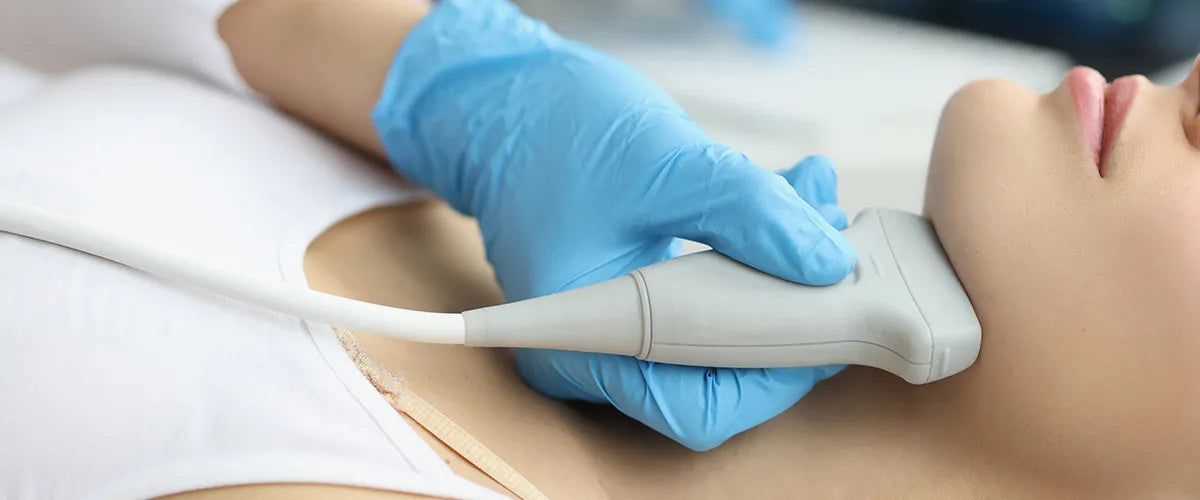
Jaw cancer, which originates directly in the jawbone, is a very rare form of cancer. More commonly, malignant tumours from adjacent areas in the mouth metastasise to the jaw. Discover everything yo...

